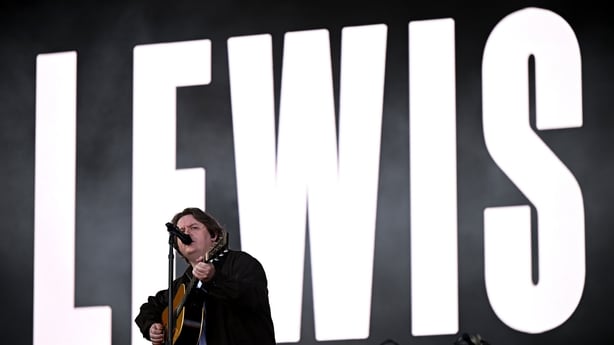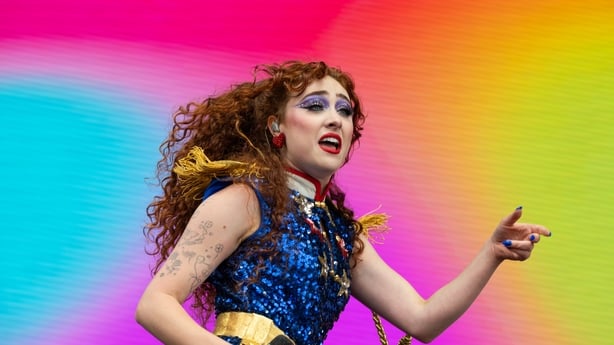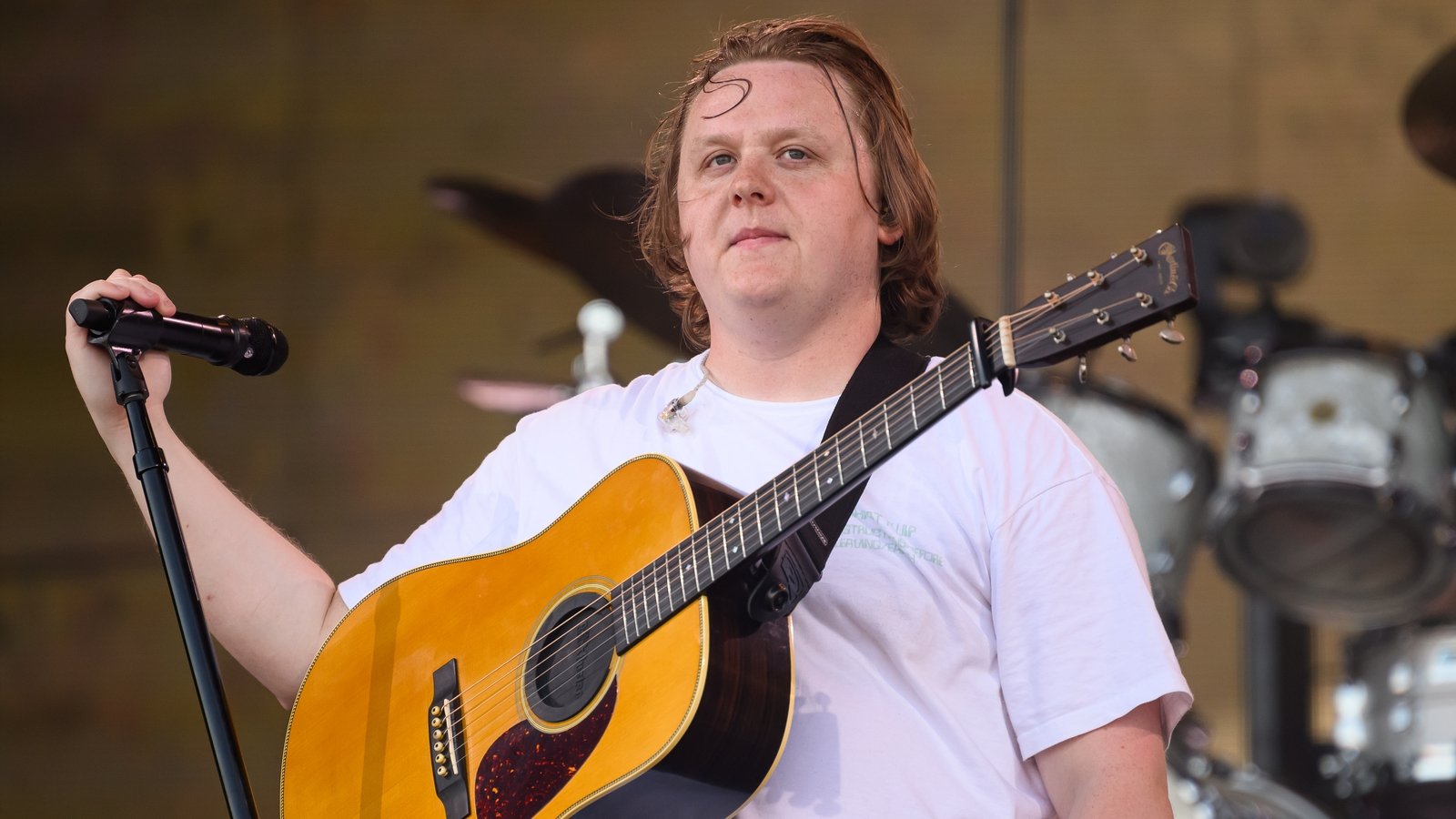Everyone loves a happy ending. And if ever there was a happy ending to be found at Glastonbury, it took the form of Lewis Capaldi’s comeback show last weekend.
Capaldi, as you may remember, had a bit of a nightmare at the world’s biggest music festival two years ago. The Scottish singer lost his voice during his set, and visibly battling severe tics due to his Tourette’s Syndrome, he struggled to perform. The footage of the crowd helping him to finish his final track Someone You Loved was undeniably touching, but it was clear that he was a man experiencing something more profound than just one bad gig. Sure enough, in the days following his Glastonbury set he announced that he was cancelling all planned gigs and taking a break from touring “for the foreseeable future.”
“I used to be able to enjoy every second of shows like this and I’d hoped 3 weeks away would sort me out,” he said in a statement posted to social media. “But the truth is, I’m still learning to adjust to the impact of my Tourette’s and on Saturday it became obvious that I need to spend much more time getting my physical and mental health in order, so I can keep doing everything I love for a long time to come.”

Lewis returned to Glastonbury 2025 in triumph
Given how Capaldi had been pitched as the jovial p*ss-taker with a sense of humour who didn’t seem to take the music industry too seriously – an image at odds with his solemn balladry – it was a big, but undeniably crucial decision. Here was an artist with a huge fanbase, primed for megastardom, knowing when to say ‘No. This isn’t right. I need to step back from this.’ His statement gained over 2.5 million likes on Instagram, and he acknowledged the overwhelming support from fans in an update in December 2023. “The support was like nothing I’ve ever experienced,” he wrote. “It has made me more excited than ever to return to doing what I love at some point in the not too distant future.”
Yes, we all love a happy ending – and what Capaldi demonstrated was that it sometimes takes putting yourself first in order to achieve one.
Capaldi’s experience goes some way to illustrating the pressures that young musicians face these days, particularly regarding their mental health. True: successful artists – and even those who aren’t quite at Glastonbury-headlining level – may have privileges, experiences and money that many of us could only dream of. Still, there is also an enormous amount of expectation on their shoulders, a pressure which has been compounded since the advent of social media, where everyone is encouraged to post, post, post, engage with your fans, show how great your life is. And if you don’t know how to handle the often rapid ascent to fame and fortune, it can really do a number on you.
Capaldi’s time off was roundly accepted by fans, but was that partly because that first Glasto clip went viral? Everyone could clearly see that he was a man coming apart at the seams, but what about the artists who are hiding their turmoil behind closed doors? As we all know, the history of music is littered with far too many tragic stories of artists who pushed themselves – or perhaps were pushed by their labels, management or fans – to the point of no return. UK mental health charity Mind claims that musicians are three times more likely to suffer from depression than non-musicians – citing pressure from labels and fans, access to addictive substances and the precarious nature of an unstable income.
Thankfully, things seem to be changing for the better. You have artists like Chappell Roan, arguably the biggest new pop star in the world right now, making no excuses for her bipolar II diagnosis as she cancelled two festival dates last year. “Things have gotten overwhelming over the last few weeks, and I am really feeling it,” she wrote. “I feel pressures to prioritize a lot of things right now, and I need a few days to prioritize my health. I want to be present when I perform and give the best shows possible. Thank you for understanding.”

Chappell Roan
Sam Fender, too, pulled his run of US tour dates with Florence and the Machine in 2022, admitting that he was “burnt out”. “I’ve neglected myself for over a year now and haven’t dealt with things that have deeply affected me,” he wrote. “It’s impossible to do this work on myself while on the road, and it’s exhausting feigning happiness and wellness for the sake of business. My friends and colleagues have been worried about me for a while and it’s not going to get better unless I take the time to do so.” He added: “It seems completely hypocritical of me to advocate for discussion on mental health and write songs about it if I don’t take time off to look after my own mental health.” Other artists, including rapper Kid Cudi, Demi Lovato and Lady Gaga, have been open about their own mental health issues, helping to destigmatise the issue by normalising it.
Capaldi’s time off was roundly accepted by fans, but was that partly because that first Glasto clip went viral?
There are also some fantastic organisations, including Music Minds Matter in the UK, and our own Minding Creative Minds here in Ireland, that are doing fantastic work in the field of safeguarding mental health. The latter organisation offers a free 24/7 counselling service, as well as various therapies, workshops, mentorship programmes and various other support systems for Irish artists and creatives who may be struggling.
Glastonbury it’s so incredible to be back, thank you so much for having me x pic.twitter.com/32n6S99fCw
— Lewis Capaldi (@LewisCapaldi) June 27, 2025
So when Lewis Capaldi stepped back out on stage at Glastonbury last weekend, two years after his last disastrous appearance, it felt like a victory lap for everyone involved. His adoring fans were still there, and even more appreciative that they were watching an artist who had prioritised his health in order to, as he said himself, continue doing what he loves for a long time.
Yes, we all love a happy ending – and what Capaldi demonstrated was that it sometimes takes putting yourself first in order to achieve one. As he put it himself as he wrapped up his short Glasto set: “My name is Lewis Capaldi and I’m f**king back, baby.”
If you have been affected by issues raised in this story, please visit www.rte.ie/helplines.
